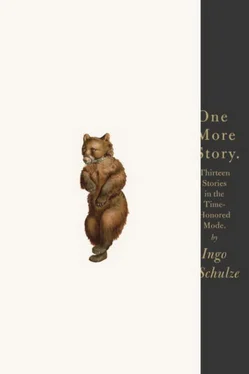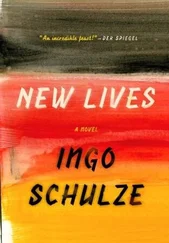I dozed away as if in a pleasant dream that relieves us of reality for minutes or hours. On my lap lay the marble gray bilingual Insel edition of Cavafy’s poems, which I had carried around with me since army days. But I wasn’t in the mood to read. Strangely enough I kept picturing the green triangle of the delta as I knew it from maps and had actually seen from the airplane. I was riding through the Nile Delta, and I thought how it was a sin to leave even a square foot of it uncultivated.
Entering Alexandria, you pass by buildings as intimidating as a scene in a Fritz Lang movie. That impression quickly fled when I was greeted on the platform by Mahmud, a truly handsome man in an olive-hued suit, gray shirt, and glowing red tie.
By the time we drove through the shopping district, with stores familiar from Europe, and suddenly turned onto the Corniche, where, beneath the gentle glow of lanterns lining the shore, the harbor basin and the sea now lay before me, I realized that I missed Sheila. Or maybe it wasn’t Sheila I missed, it just seemed sad to experience this all alone.
In the three-quarters of an hour I had to spend in the lobby of the Windsor Hotel, because something wasn’t right with my reservation, I reveled in a, if not painful at least melancholy, sort of pleasure — a somber mood to which I gave way entirely when I was served a cup of tea and a liqueurlike drink I had never encountered before.
When I finally moved into my huge room on the top floor and got the door unstuck to step out onto the balcony, I saw how the arc of lights along the Corniche turned the harbor walls into an almost perfect ellipse. As I breathed in the sea breeze blended with the odor of horse-drawn carriages, I resolved for good and all to begin an affair. I would meet a woman here with whom I felt the same sense of accord as with the schoolgirl that morning in Cairo. This curious euphoria kept me going — despite how tired I was, if not to say exhausted.
The Goethe-Institut is located in the old villa of some industrialist. As my text was being read in Arabic, I had time to check out the audience. Not a single one of the women present ignited my fantasy. The reading seemed endless, the discussion a marathon. Each word, as if it were a step up a mountain, sapped my energies. But all the same, I was in Alexandria. And so I trudged through the conversation, which lasted well past eleven. Then we set out and landed — in the Fish Market. There is also one of these restaurants overlooking the sea on the Corniche of Alexandria. Suddenly I wished I had Sheila there with me, picking up her cell phone and asking, “Mama, guess where I am?”
We were the last guests to be let into the almost empty restaurant. The buffet, however, was still full of fish. I arrived at my hotel between one and two o’clock, slept a few minutes, and then, kept awake by a strange agitation, tossed and turned in bed until dawn. Around seven I fetched Sheila’s toiletry bag, spread her things out on the pillow beside me, sprayed some of her perfume, and dialed her number. As I waited for the ring tone, I pictured the room where Sheila was now sleeping. I was amazed she even had her cell phone on. I was sure I’d hear her mailbox intervene — where you heard her say a rather dejected, “Sheila Dietze”—when she answered. I asked if everything was okay.
“Yes, of course, everything’s okay,” she said. “And how about you?”
“I couldn’t sleep.…”
“And I couldn’t brush my teeth.”
“Your own fault,” I said.
“I’ll meet you at the train, good night,” Sheila said.
I would have loved to creep back into bed after breakfast, but the cleaning women were already in the adjoining room. While waiting in the lobby for more coffee and a cola with ice, I nodded off. But the fact was I had to be alert, had to explore the city, had to experience things Sheila would regret having missed.
Sitting in my easy chair at the Windsor and sipping at my cola as if it were medicine, I could watch a steady stream of children, couples, and a few dawdling loners stop along the parapet of the Corniche to observe something down on the jetty or in the water below. Soon they had formed quite a group of spectators, whom I then finally decided to join.
Before me I found a peculiar sight. At first I thought it was a rope that the five men were dragging. It was a fishnet. The man at the head of the towing line had thrown the end of the rope over his shoulder, the others held on to the net with both hands at their chests, hips, or — turning around backward — under one arm. At first I thought they were getting nowhere since they didn’t appear to budge, but then they moved a few steps forward. The net must have been cast far out in the harbor. Following the great arc that it traced on the surface of the water by sweeping your eye to the right — that is, eastward, in the direction of the library — after about two hundred meters your gaze returned to the Corniche and a second group pulling on the other end of the net and likewise moving in our direction.
Dressed in a brimmed cap and a frayed sport coat, a short, dainty old man with stubble on his chin glanced at me and whispered, “Hello.” “Hello,” I said. “Hello,” he repeated softly and pointed to a horse-drawn carriage right behind us. I shook my head, put a finger to my eye, and then pointed at the fishermen. “After, after,” he said, pointing at me and then the carriage. I rocked my head dubiously and went back to staring out to sea, when I felt a tug at my other sleeve. “Go! Go!” a man demanded and, presumably hoping I would follow him, took a couple of steps in the direction of his carriage — which riled the driver on my right. They began cursing each other, until the one who had first spotted me whispered, “After, after,” and gave me a soothing nod.
I held my shoulder bag to my chest under crossed arms and kept my eyes fixed on the fishermen. They were, as nearly as I could tell, all older men, barefoot, some with chests bared, some with a jacket but no shirt. The barely perceptible movement with which the net drew closer, the effort exerted by the old men, the rags wrapped around their hands, their vacant stares, their gaping or tight-lipped mouths, the sweat on their swollen necks, their concentration, which demanded neither orders nor instructions, the short steps that brought them closer and closer to one another, until the two groups finally met and, without stopping or looking up for even a moment, marched past each other, crossing as if in slow motion — there was a staged unreality about it all that fascinated me. This fishing operation was something I could tell Sheila about.
Whenever the driver beside me raised his scratchy voice, I could be certain that competition was approaching. If he got louder still, in the next moment I would feel a hand touch me, only to be instantly shooed away by the short driver. At one point he even smoothed the wrinkles from my sport coat. The whole time he kept reminding me of his presence with low “hellos” and a hand raised in greeting.
The groups working the net had stopped about fifty meters apart and now, leaning back and treading in place, hauled the net in.
Two men sprang into the water from a small boat that had followed the net at the point of its widest expanse — only now did I recognize them as part of the operation — and where the ends of the net crossed began to stomp about and slap the water in hope of blocking the last escape route.
The groups working the net approached each other again, moving sideways until at last they merged into a single unit. The water in front of them began to stir; I thought it was the roiling of the fish, but it was only the stomping and splashing of the two swimmers. I joined everyone else and scrambled up onto the parapet. We were all staring at the net.
Читать дальше












